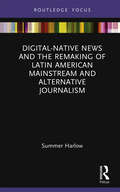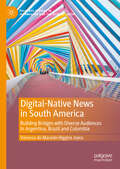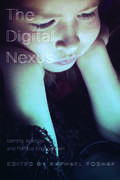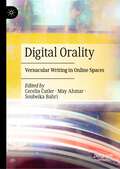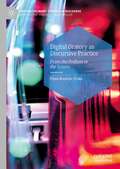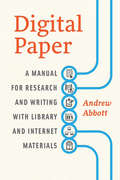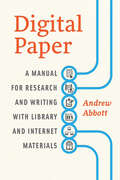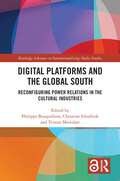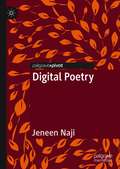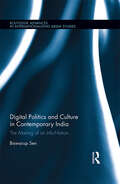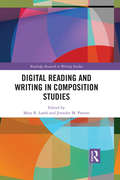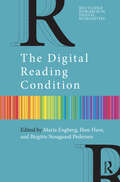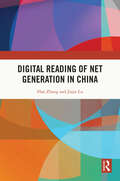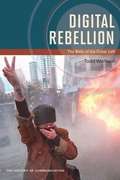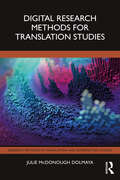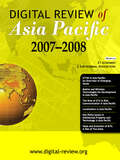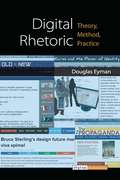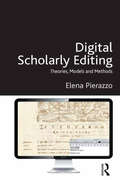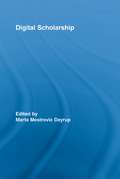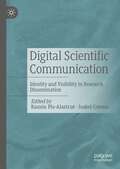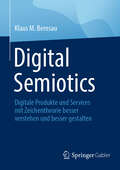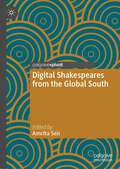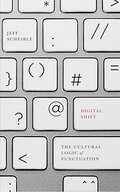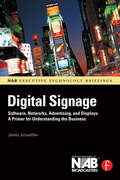- Table View
- List View
Digital-Native News and the Remaking of Latin American Mainstream and Alternative Journalism (Disruptions)
by Summer HarlowDigital-Native News and the Remaking of Latin American Mainstream and Alternative Journalism explores the rise of independent, digital-native news outlets in Latin America and their role in social change, protest participation, and the refinement of the concept of "alternative" media. Drawing upon a decade of original research, including interviews, surveys, focus groups, and content analyses, this book questions how the emergence of online-native news sites in Latin America is redefining our understanding of what it means to be mainstream and what it means to be alternative. By analyzing a wide range of elements, from business models and audience behaviors to social media use and the role of gender, this text examines how these sites are challenging traditional, hegemonic mainstream news media and its service to political and economic elites. The result is a discerning investigation into the new brand of journalism these sites have innovated. This insightful study will be of interest to journalism, communication, and Latin American scholars, particularly those interested in how technology is moulding journalistic practices and changing conceptions of journalism itself.
Digital-Native News in South America: Building Bridges with Diverse Audiences in Argentina, Brazil and Colombia (Palgrave Studies in Journalism and the Global South)
by Vanessa de Macedo Higgins JoyceThis book investigates the strategies used by South American digital-native news media in attracting diverse audiences, and their effectiveness, from an audience perspective, in bridging communities and building consensus.In recent years, independent digital news outlets have emerged in a landscape of increasing ideological polarization. The book addresses the pivotal question of whether these organizations can help promote social cohesion and overcome a divided and fragmented market. Drawing from extensive interviews conducted with audience members, journalists, and media executives from the established news markets of Argentina, Brazil and Colombia, de Macedo Higgins Joyce sheds new theoretical insights on the strategies and practice of independent digital news, its evolution, and its agenda-setting impact in the region.Innovative and rigorous, Digital-Natives News in South America deftly explores this new and important field of research and will be of interest to journalism researchers and media practitioners alike.
The Digital Nexus: Identity, Agency, and Political Engagement
by Raphael FoshayOver half a century ago, in The Gutenberg Galaxy (1962), Marshall McLuhan noted that the overlap of traditional print and new electronic media like radio and television produced widespread upheaval in personal and public life: Even without collision, such co-existence of technologies and awareness brings trauma and tension to every living person. Our most ordinary and conventional attitudes seem suddenly twisted into gargoyles and grotesques. Familiar institutions and associations seem at times menacing and malignant. These multiple transformations, which are the normal consequence of introducing new media into any society whatever, need special study. The trauma and tension in the daily lives of citizens as described here by McLuhan was only intensified by the arrival of digital media and the Web in the following decades. The rapidly evolving digital realm held a powerful promise for creative and constructive good—a promise so alluring that much of the inquiry into this new environment focused on its potential rather than its profound impact on every sphere of civic, commercial, and private life. The totalizing scope of the combined effects of computerization and the worldwide network are the subject of the essays in The Digital Nexus, a volume that responds to McLuhan’s request for a “special study” of the tsunami-like transformation of the communication landscape. These critical excursions provide analysis of and insight into the way new media technologies change the workings of social engagement for personal expression, social interaction, and political engagement. The contributors investigate the terms and conditions under which our digital society is unfolding and provide compelling arguments for the need to develop an accurate grasp of the architecture of the Web and the challenges that ubiquitous connectivity undoubtedly delivers to both public and private life. Contributions by Ian Angus, Maria Bakardjieva, Daryl Campbell, Sharone Daniel, Andrew Feenberg, Raphael Foshay, Carolyn Guertin, David J. Gunkel, Bob Hanke, Leslie Lindballe, Mark McCutcheon, Roman Onufrijchuk, Josipa G. Petrunić, Peter J. Smith, Lorna Stefanick, Karen Wall.
Digital Orality: Vernacular Writing in Online Spaces
by Cecelia Cutler May Ahmar Soubeika BahriThis volume showcases innovative research on dialectal, vernacular, and other forms of “oral,” speech-like writing in digital spaces. The shift from a predominantly print culture to a digital culture is shaping people's identities and relationships to one another in important ways. Using examples from distinct international contexts and language varieties (kiAmu, Lebanese, Ettounsi, Shanghai Wu, Welsh English, and varieties of American English) the authors examine how people use unexpected codes, scripts, and spellings to say something about who they are or aspire to be. This book will be of particular interest to students and scholars interested in the impact of social media on language use, style, and orthography, as well as those with a broader interest in literacy, communication, language contact, and language change.
Digital Oratory as Discursive Practice: From the Podium to the Screen (Postdisciplinary Studies in Discourse)
by Fiona Rossette-CrakeThis book offers an appraisal of oratory, old and new, relating former discourse practice to a specific sub-set of contemporary, digital practices. The author explores the interface between language and society, providing an interdisciplinary study at the crossroads of discourse, linguistics, communication and rhetoric. The comparisons she draws are particularly pertinent in light of the steep rise in presentations given during video-conferences, webinars, and other online events during the COVID-19 pandemic, an event which accelerated previous moves towards digital communication and which is likely to have a long-term impact on communication styles. This book will be of interest to academics and students in fields including discourse analysis, applied linguistics, communication studies, digital studies and business studies.
Digital Paper: A Manual for Research and Writing with Library and Internet Materials
by Andrew AbbottToday’s researchers have access to more information than ever before. Yet the new material is both overwhelming in quantity and variable in quality. How can scholars survive these twin problems and produce groundbreaking research using the physical and electronic resources available in the modern university research library? In Digital Paper, Andrew Abbott provides some much-needed answers to that question. Abbott tells what every senior researcher knows: that research is not a mechanical, linear process, but a thoughtful and adventurous journey through a nonlinear world He breaks library research down into seven basic and simultaneous tasks: design, search, scanning/browsing, reading, analyzing, filing, and writing. He moves the reader through the phases of research, from confusion to organization, from vague idea to polished result. He teaches how to evaluate data and prior research; how to follow a trail to elusive treasures; how to organize a project; when to start over; when to ask for help. He shows how an understanding of scholarly values, a commitment to hard work, and the flexibility to change direction combine to enable the researcher to turn a daunting mass of found material into an effective paper or thesis. More than a mere how-to manual, Abbott’s guidebook helps teach good habits for acquiring knowledge, the foundation of knowledge worth knowing. Those looking for ten easy steps to a perfect paper may want to look elsewhere. But serious scholars, who want their work to stand the test of time, will appreciate Abbott’s unique, forthright approach and relish every page of Digital Paper.
Digital Paper: A Manual for Research and Writing with Library and Internet Materials (Chicago Guides to Writing, Editing, and Publishing)
by Andrew AbbottToday’s researchers have access to more information than ever before. Yet the new material is both overwhelming in quantity and variable in quality. How can scholars survive these twin problems and produce groundbreaking research using the physical and electronic resources available in the modern university research library? In Digital Paper, Andrew Abbott provides some much-needed answers to that question. Abbott tells what every senior researcher knows: that research is not a mechanical, linear process, but a thoughtful and adventurous journey through a nonlinear world. He breaks library research down into seven basic and simultaneous tasks: design, search, scanning/browsing, reading, analyzing, filing, and writing. He moves the reader through the phases of research, from confusion to organization, from vague idea to polished result. He teaches how to evaluate data and prior research; how to follow a trail to elusive treasures; how to organize a project; when to start over; when to ask for help. He shows how an understanding of scholarly values, a commitment to hard work, and the flexibility to change direction combine to enable the researcher to turn a daunting mass of found material into an effective paper or thesis. More than a mere how-to manual, Abbott’s guidebook helps teach good habits for acquiring knowledge, the foundation of knowledge worth knowing. Those looking for ten easy steps to a perfect paper may want to look elsewhere. But serious scholars, who want their work to stand the test of time, will appreciate Abbott’s unique, forthright approach and relish every page of Digital Paper.
Digital Platforms and the Global South: Reconfiguring Power Relations in the Cultural Industries (Routledge Advances in Internationalizing Media Studies)
by Philippe Bouquillion Christine IthurbideThis book addresses the issues raised by digital platforms in the Global South, with an emphasis on the cultural stakes involved.It brings together an interdisciplinary team of researchers – including political economists, socio-economists, geographers, media sociologists or anthropologists – who each explore these issues through an insightful case study at a local, national, regional or international scale. While studying the strategies of some of the main US-based Big Tech platforms or video streaming platforms towards the Global South, the chapters also consider the often-neglected active role local or regional actors play in the expansion of those Western digital players, and highlight the existence of a constellation of local or regional platforms that have emerged in Africa, Asia, Latin America or the Middle East. In addition to analysing the complex relationships of competition, collaboration or dependence between these diverse actors, this volume examines the ways in which the rise of these digital platforms has generated new forms of cultural entrepreneurship and participated in the reconfiguring of the conditions in which cultural contents are produced and circulated in the Global South.This volume will appeal to readers interested in the transnationalisation of cultural industries or in the social, political, economic, cultural and geopolitical dimensions of digital transformations and will be an important resource for students, teachers and researchers in media, communication, cultural studies, international relations and area studies programmes.The Open Access version of this book, available at http://www.taylorfrancis.com, has been made available under a Creative Commons [Attribution-Non Commercial-No Derivatives (CC-BY-NC-ND)] 4.0 license.
Digital Platforms and the Global South: Reconfiguring Power Relations in the Cultural Industries (Routledge Advances in Internationalizing Media Studies)
by Christine Ithurbide Tristan MattelartThis book addresses the issues raised by digital platforms in the Global South, with an emphasis on the cultural stakes involved. It brings together an interdisciplinary team of researchers – including political economists, socio-economists, geographers, media sociologists or anthropologists – who each explore these issues through an insightful case study at a local, national, regional or international scale. While studying the strategies of some of the main US-based Big Tech platforms or video streaming platforms towards the Global South, the chapters also consider the often-neglected active role local or regional actors play in the expansion of those Western digital players, and highlight the existence of a constellation of local or regional platforms that have emerged in Africa, Asia, Latin America or the Middle East. In addition to analysing the complex relationships of competition, collaboration or dependence between these diverse actors, this volume examines the ways in which the rise of these digital platforms has generated new forms of cultural entrepreneurship and participated in the reconfiguring of the conditions in which cultural contents are produced and circulated in the Global South. This volume will appeal to readers interested in the transnationalisation of cultural industries or in the social, political, economic, cultural and geopolitical dimensions of digital transformations and will be an important resource for students, teachers and researchers in media, communication, cultural studies, international relations and area studies programmes.
Digital Poetry
by Jeneen NajiThis book examines contemporary forms of digital poetry in emerging technologies such as drones, machine learning, Instagram, virtual reality and mobile devices. Theoretical frameworks that engage with posthumanism, multimodality, hermeneutics and eco-writing are used to examine the changing shape of the literary artefact in the second age of machines. The book contextualises the necessity of a multidisciplinary approach for a complex artefact and gives a broad overview of the field and history of digital poetry as a subset of the genre of electronic literature. Naji examines Instapoetry and the literary algorithm, haptic hermeneutics and poetry apps. The discussion also engages with eco-writing and drone poetry, poetic mirror worlds, and mixed reality poetry, concluding with an examination of the future of poetics and literary expression in the second age of machines.
Digital Politics and Culture in Contemporary India: The Making of an Info-Nation (Routledge Advances in Internationalizing Media Studies)
by Biswarup SenThe relationship between information and the nation-state is typically portrayed as a face-off involving repressive state power and democratic flows: Twitter and the Arab Spring, Google in China, WikiLeaks and the U.S. State Department. Less attention has been paid to those scenarios where states have regarded information and its diffusion as productive of modernity and globalization. It is the central argument of this book that the contemporary nation-state, especially in the global South, is far from hostile to the current informational milieu and in fact makes crucial use of it in order to develop adequate modes of governance, communication and sociality in a networked world. This book focuses on India – an emerging country that has recently witnessed a "software miracle" – to highlight the critical role informatics has historically played in the national imagination and to demonstrate how the state, private capital and civic society have drawn upon and engaged the precepts and protocols of the information age to fashion an "info-nation."
Digital Reading and Writing in Composition Studies (Routledge Research in Writing Studies)
by Mary R. Lamb Jennifer M. ParrottAs digital reading has become more productive and active, the lines between reading and writing become more blurred. This book offers both an exploration of collaborative reading and pedagogical strategies for teaching reading and writing that reflect the realities of digital literacies. This edited scholarly collection offers strategies for teaching reading and writing that highlight the possibilities, opportunities, and complexities of digital literacies. Part 1 explores reading and writing that happen digitally and offers frameworks for thinking about this process. Part 2 focuses on strategies for the classroom by applying reading theories, design principles, and rhetorical concepts to instruction. Part 3 introduces various disciplinary implications for this blended approach to writing instruction. What is emerging is new theories and practices of reading in both print and digital spaces—theories that account for how diverse student readers encounter and engage digital texts. This collection contributes to this work by offering strategies for sustaining reading and cultivating writing in this landscape of changing digital literacies. The book is essential for the professional development of beginning teachers, who will appreciate the historical and bibliographic overview as well as classroom strategies, and for busy veteran teachers, who will gain updated knowledge and a renewed commitment to teaching an array of literacy skills. It will be ideal for graduate seminars in composition theory and pedagogy, both undergraduate and graduate; and teacher education courses, and will be key reading for scholars in rhetoric and composition interested in composition history, assessment, communication studies, and literature pedagogy.
The Digital Reading Condition
by Maria Engberg Iben Have Birgitte Stougaard PedersenThis volume offers a critical overview of digital reading practices and scholarly efforts to analyze and understand reading in the mediatized landscape. Building on research about digital reading, born-digital literature, and digital audiobooks, The Digital Reading Condition explores reading as part of a broader cultural shift encompassing many forms of media and genres. Bringing together research from media and literary studies, digital humanities, scholarship on reading and learning, as well as sensory studies and research on multimodal and multisensory media reception, the authors address and challenge print-biased conceptions of reading that are still prevalent in research, whether the reading medium is print or digital. They argue that the act of reading itself is changing, and rather than rejecting digital media as unsuitable for sustained or focused reading practices, they argue that the complex media landscape challenges us to rethink how to define reading as a mediated practice. Presenting a truly interdisciplinary perspective on digital reading practices, this volume will appeal to scholars and graduate students in communication, media studies, new media and technology, literature, digital humanities, literacy studies, composition, and rhetoric.
Digital Reading of Net Generation in China
by Han ZHANG Jiajie LUWith the methodology of eye-tracking experiments, in-depth interviews and large-scale questionnaires across cities, this book provides a panoramic vision of digital reading and social interaction among the new generations in China. Growing up under the background of social transformation, cultural integration and technological progress, digital reading of the Chinese net generation presents complex characteristics. People born in the 1980s and 90s are better educated, have democratic consciousness, and have strong motivations for self-expression. Meanwhile, reading behaviours affect their content production, virtual identities, and socialization in the real world. The immense need for digital content fuels the digital reading industries. Internet literature, social media articles, reading APPs and e-reader devices have also benefited from media content and interface innovation in the market. This book provides a solid scientific foundation for reading promotion and guiding strategies in the context of digital media and offers empirical evidence for policy formulation of reading promotion and spiritual civilization in the digital age. The authors expand the perspective of communication studies on digital reading and analyze how the youth reads on digital devices and creates content for interest or profit. The book will be a great read for students and scholars of mass communication, media studies and digital publishing.
Digital Rebellion: The Birth of the Cyber Left
by Todd WolfsonDigital Rebellion examines the impact of new media and communication technologies on the spatial, strategic, and organizational fabric of social movements. Todd Wolfson begins with the rise of the Zapatistas in the mid-1990s, and how aspects of the movement--network organizational structure, participatory democratic governance, and the use of communication tools as a binding agent--became essential parts of Indymedia and all Cyber Left organizations. From there he uses oral interviews and other rich ethnographic data to chart the media-based think tanks and experiments that continued the Cyber Left's evolution through the Independent Media Center's birth around the 1999 WTO protests in Seattle. After examining the historical antecedents and rise of the global Indymedia network, Wolfson melds virtual and traditional ethnographic practice to explore the Cyber Left's cultural logic, mapping the social, spatial and communicative structure of the Indymedia network and detailing its operations on the local, national and global level. He also looks at the participatory democracy that governs global social movements and the ways the movement's twin ideologies, democracy and decentralization, have come into tension, and how what he calls the switchboard of struggle conducts stories of shared struggle from the hyper-local and dispersed worldwide. As Wolfson shows, understanding the intersection of Indymedia and the Global Social Justice Movement illuminates their foundational role in the Occupy struggle, Arab Spring uprising, and the other emergent movements that have in recent years re-energized radical politics.
Digital Research Methods for Translation Studies (Research Methods in Translation and Interpreting Studies)
by Julie McDonough DolmayaDigital Research Methods for Translation Studies introduces digital humanities methods and tools to translation studies. This accessible book covers computer-assisted approaches to data collection, data analysis, and data visualization and presentation, offering authentic examples of these approaches in both translation studies research and projects from related fields. With a diverse range of examples featuring various contexts and language combinations to ensure relevance to a wide readership, this volume covers the strengths and limitations of computer-assisted research methods, as well as the ethical challenges specific to this kind of research. This is an essential text for advanced undergraduate and graduate translation studies students, as well as researchers looking to adopt new research methods.
Digital Review of Asia Pacific 2007/2008
by IdrcThe biennial Digital Review of Asia Pacific is a comprehensive guide to the state-of-practice and trends in information and communication technologies for development (ICT4D) in Asia Pacific This third edition (2007-2008) covers 31 countries and economies, including North Korea for the first time. Each country chapter presents key ICT policies, applications and initiatives for national development. In addition, five thematic chapters provide a synthesis of some of the key issues in ICT4D in the region, including mobile and wireless technologies, risk communication, intellectual property regimes and localization. The authors are drawn from government, academe, industry and civil society, providing a broad perspective on the use of ICTs for human development.
Digital Rhetoric: Theory, Method, Practice
by Douglas EymanWhat is "digital rhetoric"? This book aims to answer that question by looking at a number of interrelated histories, as well as evaluating a wide range of methods and practices from fields in the humanities, social sciences, and information sciences to determine what might constitute the work and the world of digital rhetoric. The advent of digital and networked communication technologies prompts renewed interest in basic questions such as What counts as a text? and Can traditional rhetoric operate in digital spheres or will it need to be revised? Or will we need to invent new rhetorical practices altogether? Through examples and consideration of digital rhetoric theories, methods for both researching and making in digital rhetoric fields, and examples of digital rhetoric pedagogy, scholarship, and public performance, this book delivers a broad overview of digital rhetoric. In addition, Douglas Eyman provides historical context by investigating the histories and boundaries that arise from mapping this emerging field and by focusing on the theories that have been taken up and revised by digital rhetoric scholars and practitioners. Both traditional and new methods are examined for the tools they provide that can be used to both study digital rhetoric and to potentially make new forms that draw on digital rhetoric for their persuasive power.
Digital Scholarly Editing: Theories, Models and Methods (Digital Research in the Arts and Humanities #Vol. 4)
by Elena PierazzoThis book provides an up-to-date, coherent and comprehensive treatment of digital scholarly editing, organized according to the typical timeline and workflow of the preparation of an edition: from the choice of the object to edit, the editorial work, post-production and publication, the use of the published edition, to long-term issues and the ultimate significance of the published work. The author also examines from a theoretical and methodological point of view the issues and problems that emerge during these stages with the application of computational techniques and methods. Building on previous publications on the topic, the book discusses the most significant developments in digital textual scholarship, claiming that the alterations in traditional editorial practices necessitated by the use of computers impose radical changes in the way we think and manage texts, documents, editions and the public. It is of interest not only to scholarly editors, but to all involved in publishing and readership in a digital environment in the humanities.
Digital Scholarship (Routledge Studies in Library and Information Science)
by Marta Mestrovic DeyrupCollecting important original essays by librarians and archivists – all of whom are actively engaged in building digital collections – Digital Scholarship details both challenges and proven solutions in establishing, maintaining, and servicing digital scholarship in the humanities. This volume further explores the ways in which the humanities have benefited from the ability to digitize text and page images of historic documents, mine large corpuses of texts and other forms of records, and assemble widely dispersed cultural objects into common repositories for comparison and analysis--making new research questions and methods possible for the first time. The ten notable scholars included in Digital Scholarship offer a balanced view of the strengths and weaknesses of various approaches to digitization, reporting both progress and problems, examining new business models, new forms of partnerships, and the new technologies and resources that make many more library and archival services available. Librarians and library staff everywhere will find Digital Scholarship an essential text for the modern library and an illuminating resource for anyone looking to understand the changing face of research in the electronic age.
Digital Scientific Communication: Identity and Visibility in Research Dissemination
by Ramón Plo-Alastrué Isabel CoronaThis edited book analyses current trends in science communication and gathers research on practices related to the construction of digital identity and visibility, emerging conflicts related to the public availability and appropriation of scientific culture, and ways of validating and disseminating scientific knowledge in new digital contexts. Drawing on a selection of papers presented in the InterGedi Conference (Zaragoza, December 2021), the main goal of the volume is to identify and explore emerging professional practices and challenges in the digital communication of science through innovative multimodal genres. This book will be of interest to postgraduates, doctoral students, practitioners and researchers in the fields of discourse analysis, sociolinguistics, digital media, multimodality and communication studies.
Digital Semiotics: Digitale Produkte und Services mit Zeichentheorie besser verstehen und besser gestalten
by Klaus M. BernsauDieses Buch erklärt, wie Unternehmen mit Hilfe der Semiotik – der Lehre von den Zeichen – ihre digitalen Produkte und Dienstleistungen erfolgreicher machen können. Denn die Wellness-App, der Warenkorb im Onlineshop oder der Like-Button in der Produktansicht haben eines gemeinsam: Sie basieren auf digitalen Zeichen. Diese kundengerecht einzusetzen, wird immer mehr zum Schlüssel für das Produkterlebnis und damit zur Voraussetzung für den Produkterfolg. Die moderne Semiotik verbindet Sprachwissenschaft, Erkenntnistheorie, Anthropologie, Psychologie und Sozialwissenschaften zu einem faszinierenden Blick auf digitale Angebote. Der Autor zeigt, wie Unternehmen diese Erkenntnisse nutzen können und liefert ein praxisnahes Buch für Produktmanager*innen, Marketer*innen, Kommunikator*innen, Designer*innen, Softwareentwickler*innen – kurz: für alle, die für digitale Produkte und Dienstleistungen verantwortlich sind.
Digital Shakespeares from the Global South (Global Shakespeares)
by Amrita SenDigital Shakespeares from the Global South re-directs current conversations on digital appropriations of Shakespeare away from its Anglo-American bias. The individual essays examine digital Shakespeares from South Africa, India, and Latin America, addressing questions of accessibility and the digital divide. This book will be of interest to students and academics working on Shakespeare, adaptation studies, digital humanities, and media studies.Included in this volume, the chapter on “Finding and Accessing Shakespeare Scholarship in the Global South: Digital Research and Bibliography” by Heidi Craig and Laura Estill is available open access under a Creative Commons Attribution 4.0 International License via link.springer.com.
Digital Shift: The Cultural Logic of Punctuation
by Jeff ScheibleEmoticons matter. Equal signs do, too. This book takes them seriously and shows how and why they matter. Digital Shift explores the increasingly ubiquitous presence of punctuation and typographical marks in our lives⎯using them as reading lenses to consider a broad range of textual objects and practices across the digital age. Jeff Scheible argues that pronounced shifts in textual practices have occurred with the growing overlap of crucial spheres of language and visual culture, that is, as screen technologies have proliferated and come to form the interface of our everyday existence. Specifically, he demonstrates that punctuation and typographical marks have provided us with a rare opportunity to harness these shifts and make sense of our new media environments. He does so through key films and media phenomena of the twenty-first century, from the popular and familiar to the avant-garde and the obscure: the mass profile-picture change on Facebook to equal signs (by 2.7 million users on a single day in 2013, signaling support for gay marriage); the widely viewed hashtag skit in Jimmy Fallon&’s Late Night show; Spike Jonze&’s Adaptation; Miranda July&’s Me and You and Everyone We Know; Ryan Trecartin&’s Comma Boat; and more. Extending the dialogue about media and culture in the digital age in original directions, Digital Shift is a uniquely cross-disciplinary work that reveals the impact of punctuation on the politics of visual culture and everyday life in the digital age.
Digital Signage: Software, Networks, Advertising, and Displays: A Primer for Understanding the Business
by Jimmy SchaefflerDigital Signage gives you macro and micro views of the burgeoning digital signage industry. Whether you are looking for new opportunities or to expand your business, with this book you will be able to clearly understand and accurately analyze the developments, trends and projections. As part of the NAB Executive Technology Briefing series, this book features the future impact of the technology across many different industries and platforms. Explanations of hardware such as displays, servers, and PCs, software such as dynamic on-screen content and software management programs, and technologies like systems integrations and network infrastructures are all covered.
